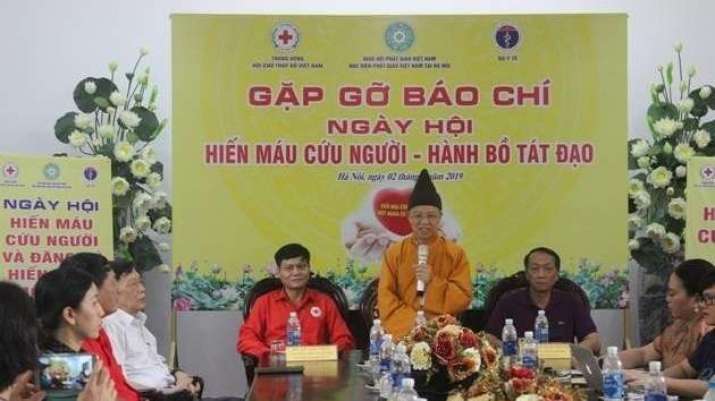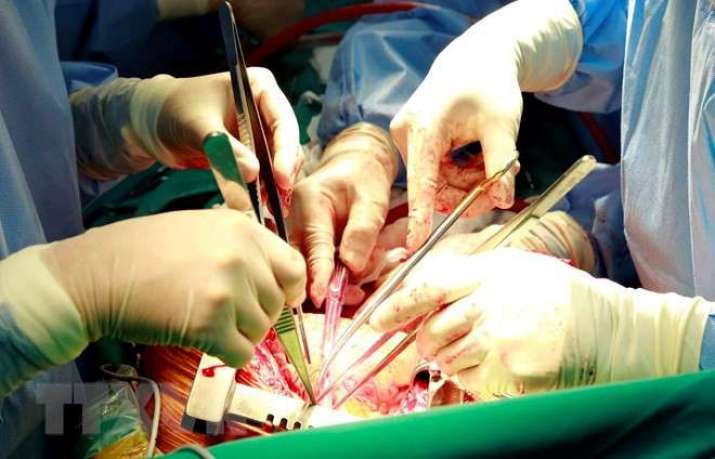
At a blood and organ donation registration ceremony held in Hanoi on Sunday, more than 500 Buddhist monks and nuns, and lay followers registered for a blood donation drive, with 150 people signing up as organ donors. The event was jointly organized by the Vietnam Red Cross Society (VRCS), the Vietnam Buddhist Academy (VBA), and the Vietnam National Institute of Hematology and Blood Transfusion.
Speaking on the occasion, VBA head Venerable Thich Thanh Quyet, also vice-chairman of the Vietnam Buddhist Sangha’s (VBS) executive council, said the project was held in response to the Vietnamese prime minister’s call for collaboration between the VBS and the VRCS on humanitarian activities. Ven. Quyet also expressed his own intention to donate blood and organs.
Remarking on the significance of the blood and organ drive, Ven. Quyet said that blood and organ donation would form a regular part of the academy’s activities, noting that in various incarnations, the historical Buddha gave his own eyes, limbs, and flesh to those in need. “If we can’t give away a part of ourselves to save others, we can’t reach nirvana,” Ven. Quyet added. (dti news)
Vietnamese deputy prime minister Truong Hoa Binh commended the initiative and advised the Ministry of Health, the VRCS, and the VBS to continue the program at Buddhist centers nationwide, emphasizing the need to raise public awareness on the important issue of blood and organ donation. He reviewed the nearly 2,000-year history of Buddhism in Vietnam by remarking that Buddhism had greatly influenced religious fellowship with the nation.
Local news outlets also reported that in May this year, about 600 monks, nuns and lay Buddhists registered to donate organs and tissues during a drive held at Giac Ngo Pagoda in Ho Chi Minh City. The Dao Phat Ngay Nay (Buddhism Today) Foundation, operated by Giac Ngo Pagoda, has also previously organized organ donation drives in 2015, 2016, and 2017, with a total of 1,360 people registered.
According to the dti news website, Vietnam has 19 organ transplant centers which have conducted about 3,700 transplants, of which 3,514 were kidney transplants. As of March this year, some 20,000 people had registered to donate their organs after death, a marked increase compared with five years earlier. As of July, the figure had increased to 25,000.

The first organ transplant conducted in Vietnam was a kidney transplant at Military Hospital 103 in Hanoi on 4 June 1992. The recipient was 40-year-old Vu Manh Doan, who was in the last stage of chronic kidney failure.
Although organ donation in Vietnam has grown rapidly, many people remain concerned about the implications for receiving a traditional funeral. Another apprehension is that there is significant blackmarket demand for organs, which could lead to botched surgeries, uninformed donors, and unnecessary deaths.
According to media reports, about 8,000 Vietnamese patients need organ transplants each year, but the pool of donors is limited—mostly the patients’ own living relatives.
“We should encourage people in the community to participate in tissue and organ donation and to register for voluntary donation when still living but braindead,” said Prof. Dr. Nguyen Tien Quyet, director of the Vietnam-Germany Friendship Hospital. “Organ donation is a humanitarian act and an aid to research. Communications should be carried out among religious communities, training schools, hospitals, and medical facilities.” (Vovworld)
See more
Over 650 Buddhist monks, followers register for blood, organ donation (VietNamNet)
Vietnam Buddhist Academy to host blood donation festival (Nhan Dan)
Vietnam makes strides in organ transplants (Vovworld)
Buddhists back blood donation (dti news)












